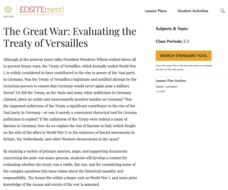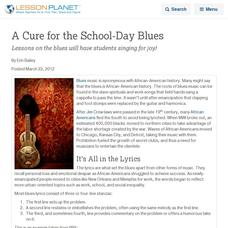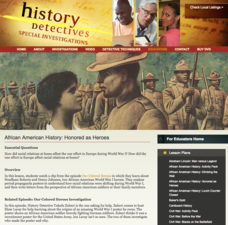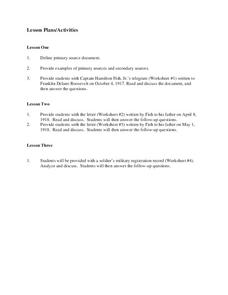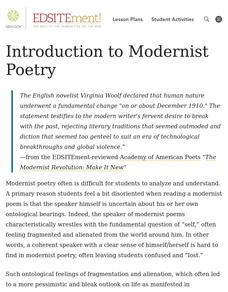Curated OER
Poetry of The Great War: 'From Darkness to Light'?
Young scholars examine World War I poetry for historical context, poetic devices, and participate in a class discussion. They write an analysis of the poetry's form and its content.
Curated OER
Why do wars occur?
Understanding the causes of war is one way (possibly) to prevent it. World War II is used as a case study to facilitate an understanding of reasons why wars start. Topics covered included Totalitarianism, scarcity of resources, need for...
Syracuse University
World War I
World War I was known for its gruesome battlefields and horrific injuries. Using photographs from a battlefield surgeon's scrapbook, scholars see first-hand what life was like in the trenches. After creating a timeline of the war using...
Curated OER
African-American Soldiers After World War I: Had Race Relations Changed?
Students utilize an online database to conduct research and analyze the conditions for African-Americans before and after World War I. They consider the role of the 92nd and 93rd divisions in affecting social change.
Curated OER
Modernism: American Literature 1914-1945
What characterizes modern literature? The first few slides of this 31-slide PowerPoint discuss what sparked the change to Modernism and discuss some of the key figures of the time (like Karl Marx and Sigmund Freud). The 20s and 30s are...
British Council
The Christmas Truce
Imagine calling a truce in the middle of a war, singing Christmas carols with the enemy, exchanging gifts, and playing a game of football. Such a thing actually happened. Class members listen the stories of soldiers who experienced the...
Curated OER
The Great War: Evaluating the Treaty of Versailles
Young scholars examine and evaluate the Treaty of Versailles. They read and discuss primary source documents, explore various websites, develop a list of postwar goals for France, Germany, and the U.S., and evaluate whether the treaty...
National Endowment for the Humanities
The Music of African American History
High schoolers examine role spirituals have played in African American history and religion, examine Harriet Tubman's use of spirituals in her work, explore power of spirituals in Civil Rights Movement, and work with oral tradition,...
Curated OER
A Cure for the School-Day Blues
Lessons on the Blues will have students singing for joy!
Curated OER
Ready Set Go Woah: KWL for Ender's Game
Readers of Orson Scott Card's award-winning science fiction novel, Ender's Game use the provided KWL worksheet to list what they already know about war, what they think they will learn in reading the book, the new information they did...
Alabama Department of Archives and History
Alabama and the Treaty of Versailles
As part of a study of the treaty that ended World War I and the seeds of resentment it planted, class groups compare President Wilson's Fourteen Points and the articles of the Treaty of Versailles.
Mountain View High School
World War I Research Project
Here is a fantastic World War I research project that includes clear guidelines for topic choice, guiding questions, and suggested presentation products. Research subjects range from battles of the war, trench warfare, and weaponry, to...
Roy Rosenzweig Center for History and New Media
War and Poetry
A band of brothers or the Devil's agents? Nobel warriors freeing the oppressed or mercenaries working for the military/industrial complex? Groups examine poems from the Civil War, World War I, and World War II to determine the poets'...
PBS
African American History: Honored as Heroes
To gain an understanding of the treatment of African American soldiers during World War I, class members watch an excerpt from the History Detectives film, Our Colored Heroes, and then examine three recruitment posters from that time...
National History Day
Why Did the United States Enter World War I in 1917?
World War I was the first major conflict on a global scale. Using primary documents, learners determine why the United States chose to enter World War I when it did. After analytical writing and group research, the causes of America's...
CHPCS
The United States in the 1920s: The New Negro Movement and the Harlem Renaissance
Music, writing, and activism all tell the story of history! The resource uses these elements and more in a presentation to discuss the Jazz Age and Harlem Renaissance. Your class views biographies, discusses important events, and...
Washoe County School District
Eyewitness to the Holocaust
Scholars investigate the Holocaust through the eyes of an Auschwitz survivor. They analyze and research a firsthand account of events inside the gas chambers moments before hundreds died. Using Holocaust Reading Passages and...
Curated OER
Primary and Secondary Sources
Learners complete worksheets having to do with primary and secondary source documents. In this sources lesson, students define a primary source document, look at examples of primary and secondary sources. Learners complete multiple...
Curated OER
The Treaty of Versailles: The League of Nations Student Worksheet
In this world history worksheet, students read a 1-page selection as well as Internet articles about the Treaty of Versailles and the League of Nations and then respond to 8 short answer questions.
Curated OER
Dissolution of the Ottoman Empire
In this Ottoman Empire activity, students read a 3-page selection and examine maps pertaining to the topic and then respond to 7 short answer questions.
Curated OER
Origins of World War I
In this World War I worksheet, students follow the provided guidelines to conduct independent research and write research papers about aspects of the war.
Curated OER
The Treaty of Versailles: An Outside Perspective
In this World War I worksheet, students read an article about the Treaty of Versailles and examine 2 maps. Students then respond to 8 short answer questions based on the information.
Curated OER
GROUP NEWSPAPER PRESENTATIONS
Students in groups are to develop their own newspapers while keeping to a World War I outline.
Curated OER
Introduction to Modernist Poetry
Students examine the concept of modernism. They analyze different modern poetists writings and identify the context in which the poems were written. They write poems of their own to complete the activity.








